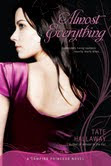I don't really think I conquered plot in class last night. I started to, but I don't think I had enough caffeine in my system to do it justice. (I'm not sure I do now, for that matter.)
What do I want to say about plot? Plot is the action of your story. It's the stuff that happens – although not always the wham-bam-thank-you-ma'am, whiz-bang moments, but also the revelations, the emotional high points or lows, and the internal reflections of your main character. (Given, of course, that these other things reveal or reflect on "the story.") Plot answers the question what happens next?
Plot is difficult to teach, because in so many ways plotting is instinctual to storytelling. If people tell you don't have a strong plot, it may be because you haven't come to terms with the story you really want to tell. Strong plotters are often people who have taken some time outside of actual writing to consider the questions of: what's at stake here? Whose story am I telling? What do I want to _say_? What is this story about, really?
I think once you know those things, plot happens fairly organically. Provided, of course, you stay true to the character's motivations. I say this, clearly, being a character-driven plot writer. (I teach my classes about idea-driven stories, but really I don't know that much about them. My friend and fellow writer Kelly McCullough is much more skilled with that sort of story than I will ever be.)
That reminds me of something else entirely...
I've been a paperback reader and writer my whole life, so I've been known to get into arguments with certain writers about plot. I believe everything should be in service to plot. In fact, at one point I joked to Walter Hunt at MarsCON that I have "in service to plot" tattooed over my heart. I don't, but I could, because I believe it that strongly.
Don't waste my time wandering down a dark alley unless the scene tells me something fundamentally important about the character. I'm not a big fan of mood, unless it tells me something about the characters or the situation. Travelogueing your way through some crunchy scenery is vaguely annoying to me, unless, again, it tells me something important about the characters or society your building (as it reflect on the story).
Serve the story! Serve it up HOT!
If a scene has nothing to do with the story, why is there? If it has no purpose, cut it.
Okay. Those are my thoughts for today. Off to find caffeine.


